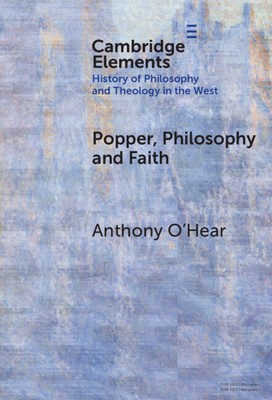
- We will send in 10–14 business days.
- Author: Anthony O'Hear
- Publisher: Cambridge University Press
- ISBN-10: 1009626795
- ISBN-13: 9781009626798
- Format: 15.2 x 22.9 x 0.6 cm, cietos vākos
- Language: English
- SAVE -10% with code: EXTRA
Reviews
Description
This Element aims to make good an imbalance in scholarly work on the thought of Karl Popper. Towards the end of his life he developed a dualistic view of the self, and connected to it, a model of reality consisting of three worlds: first the inorganic world; a second level domain of consciousness; and a third world of ideas, institutions and concepts. This third world develops beyond the ideas and understanding of its human inventors. The implications of these later developments has not been fully considered, nor has his idea that his critical rationalism rests on an irrational faith. These are considered against the context of his more famous work on science and the open society. Popper saw his late work in quasi-Platonic terms, and the similarities and differences here are explored. Does Popper's work as a whole tend in an unfulfiled Platonic direction or need a religious foundation?
EXTRA 10 % discount with code: EXTRA
The promotion ends in 23d.07:07:14
The discount code is valid when purchasing from 10 €. Discounts do not stack.
- Author: Anthony O'Hear
- Publisher: Cambridge University Press
- ISBN-10: 1009626795
- ISBN-13: 9781009626798
- Format: 15.2 x 22.9 x 0.6 cm, cietos vākos
- Language: English English
This Element aims to make good an imbalance in scholarly work on the thought of Karl Popper. Towards the end of his life he developed a dualistic view of the self, and connected to it, a model of reality consisting of three worlds: first the inorganic world; a second level domain of consciousness; and a third world of ideas, institutions and concepts. This third world develops beyond the ideas and understanding of its human inventors. The implications of these later developments has not been fully considered, nor has his idea that his critical rationalism rests on an irrational faith. These are considered against the context of his more famous work on science and the open society. Popper saw his late work in quasi-Platonic terms, and the similarities and differences here are explored. Does Popper's work as a whole tend in an unfulfiled Platonic direction or need a religious foundation?


Reviews